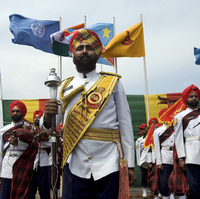President Barack Obama won fans in New Delhi last week with his call for India to take a permanent seat on the U.N. Security Council. But while the president explicitly endorsed India as an "emerged" power, his declaration contained an implicit challenge as well.
Obama said that he wanted the U.S. to work with India on an "efficient, effective, credible and legitimate" U.N. Though phrased as diplomatic rhetoric, these words raised important questions that India's leaders must answer. Can India capture a permanent seat on the Security Council simply because of its growing economic leverage and military clout? Or should India invest more in terms of strengthening the U.N. to show that the country deserves its seat on the council?
India -- like Canada or Sweden -- is a country that many automatically associate with the U.N. Articles about multilateralism are, after all, often accompanied by photos of blue-turbaned Sikh peacekeepers. Yet New Delhi's policymakers are ambivalent toward the U.N.

